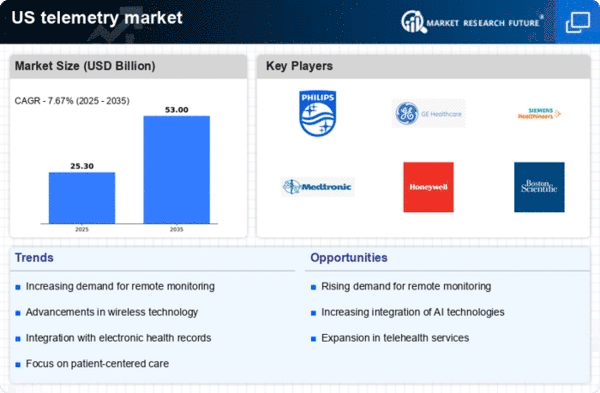Integration of Telehealth Services
The medical telemetry market is being propelled by the integration of telehealth services into traditional healthcare frameworks. As telehealth becomes more mainstream, the need for effective monitoring solutions that can seamlessly connect patients and providers is increasing. Telemetry systems play a crucial role in this integration by providing real-time data that informs clinical decisions. The market is expected to witness substantial growth, with estimates suggesting a potential increase of 20% in the adoption of telemetry solutions within telehealth platforms by 2030. This trend indicates a promising future for the medical telemetry market as it aligns with the broader shift towards digital health solutions.
Increased Focus on Patient-Centric Care
The medical telemetry market is evolving in response to the growing emphasis on patient-centric care models. Healthcare providers are increasingly prioritizing patient engagement and satisfaction, leading to a demand for solutions that empower patients to take an active role in their health management. Telemetry systems that offer remote monitoring capabilities enable patients to receive care in the comfort of their homes, fostering a more personalized approach to healthcare. This shift is likely to drive the adoption of medical telemetry solutions, as providers seek to enhance patient experiences and outcomes while reducing hospital readmissions.
Technological Advancements in Telemetry
The medical telemetry market is experiencing a surge due to rapid technological advancements. Innovations in wireless communication, sensor technology, and data analytics are enhancing the capabilities of telemetry systems. For instance, the integration of artificial intelligence (AI) and machine learning (ML) is enabling more accurate patient monitoring and predictive analytics. This evolution is likely to improve patient outcomes and reduce healthcare costs. The market is projected to grow at a CAGR of approximately 15% from 2025 to 2030, driven by these advancements. As healthcare providers increasingly adopt these technologies, the medical telemetry market is expected to expand significantly, providing better tools for clinicians and improved experiences for patients.
Rising Demand for Chronic Disease Management
The medical telemetry market is significantly influenced by the increasing prevalence of chronic diseases such as diabetes, cardiovascular disorders, and respiratory conditions. As the population ages, the demand for continuous monitoring solutions is rising. Telemetry systems facilitate real-time data collection and analysis, allowing healthcare providers to manage chronic conditions more effectively. According to recent estimates, chronic diseases account for nearly 75% of healthcare expenditures in the US. This trend underscores the necessity for advanced telemetry solutions that can provide timely interventions and improve patient care. Consequently, the medical telemetry market is poised for growth as healthcare systems seek to enhance chronic disease management.
Regulatory Support and Reimbursement Policies
The medical telemetry market benefits from favorable regulatory support and reimbursement policies that encourage the adoption of advanced monitoring technologies. Government initiatives aimed at improving healthcare delivery and patient outcomes are driving investments in telemetry solutions. For example, the Centers for Medicare & Medicaid Services (CMS) has expanded reimbursement for remote patient monitoring services, making it financially viable for healthcare providers to implement these technologies. This regulatory environment is likely to stimulate growth in the medical telemetry market, as providers are incentivized to adopt innovative solutions that enhance patient care and operational efficiency.

















